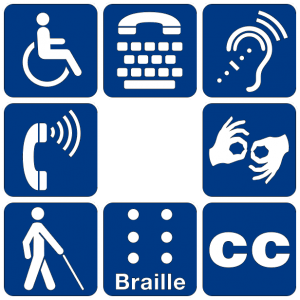Accessibility, Disability, and Open Digital Pedagogy
Thursday, November 12, 2015, 4:30-6:00pm (Faculty Commons, N227)
*Refreshments will be served
(Please share the invitation with colleagues, and RSVP by commenting on this post)
Join faculty and staff around the college at the next Open Pedagogy event, where we will discuss issues of accessibility and disability in online communities and digital spaces. Together, we’ll explore key issues at stake and brainstorm how we, as faculty and staff, might better serve our students and each other by being aware of and competent in best practices. We will start to think through our open digital pedagogy to become more inclusive of all our members as we teach, research, collaborate, and communicate in open digital spaces. We’ll consider the following questions:
- What do accessibility and disability mean and look like in online digital spaces?
- What is universal design?
- What are our responsibilities (ethical, legal, institutional, personal) to consider accessibility and disability, & implement changes to our pedagogy in response?
- “Why is accessibility often treated as an afterthought” (Hoffman 2014)?
- How can we make our work in open digital spaces more accessible?
 Want to learn more about issues of accessibility / disability in open digital pedagogies? Here are a few short pieces for reference:
Want to learn more about issues of accessibility / disability in open digital pedagogies? Here are a few short pieces for reference:
- “Disability, Design, and the Digital Humanities” (George H. Williams, Debates in the Digital Humanities, 2012)
- Recent special issue of First Monday on “Disability and the Internet” that is hot off the (digital) press, and explores a wide ranges of issues on the topic (September 2015)
- “Increasing Access and Making Practice More Inclusive through Disability Awareness Training” (Carrie E. Rood and Michelle L. Damiani, Academe, September-October 2015)
- “Accessibility” [From The World Wide Web Consortium (W3C)]
*Image credit: Disability Symbols (Wikimedia Commons)



